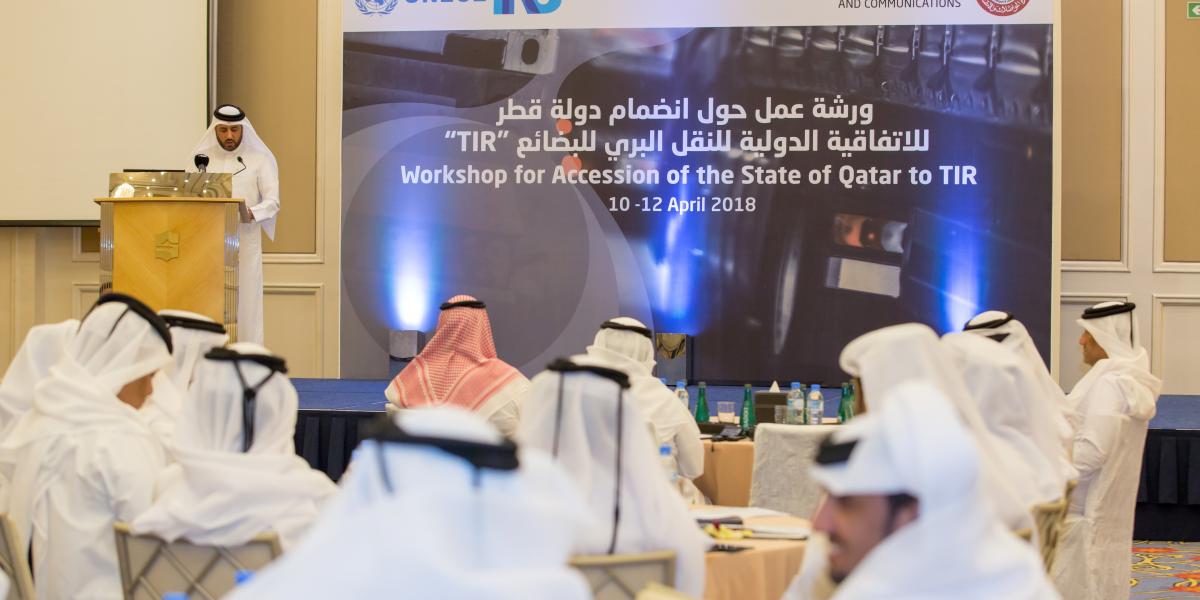Doha- Qatar
The Ministry of Transport and Communications (MOTC) held on Tuesday a workshop on Qatar's accession to the United Nations' TIR Convention, in collaboration with the International Road Transport Union (IRU) and the United Nations Economic Commission for Europe (UNECE) as well as several bodies concerned in the country.
The workshop seeks to introduce participants to the details of the Convention, present the objectives and benefits of the State of Qatar's accession to it, define the tasks and responsibilities of the parties concerned to activate the State of Qatar's accession to the Convention, as well as agree on a plan of action and timetable to complete the procedures and requirements by the concerned authorities in the State to activate Qatar's accession to the Convention.
In a speech, Rashid Taleb Al Nabit, Assistant Undersecretary for Land Transport Affairs at the MOTC, said the ministry, given the unjust siege imposed on Qatar, was keen to take all necessary measures to meet all international agreements signed with friendly countries in the transport and communications sector which shall be respected by all parties, where the land transport sector with all its modes plays a very vital role.
The ministry, he said, has facilitated the movement of international transport and trade, benefiting from the experiences and lessons learned from the development of an integrated road transport system in line with best regional and international practices.
He added that the State of Qatar has signed a number of memorandums of understanding and bilateral and multilateral agreements, including TIR Convention to facilitate the movement of trade and land transport with a view to deepening regional and international trade and economic cooperation and regulating and facilitating land transport along with its integration with other modes of transport, including ports, airports, public transport, railways and metro.
Al Nabit pointed out that the accession of Qatar to this Convention will contribute to saving transport costs significantly thanks to removing transaction fees for those goods, in addition to reducing transport duration from countries of origin to Qatar, while its other benefits include enabling free movement for land transport modes, unifying and facilitating customs procedures, facilitating and accelerating the transfer of goods from country of origin to country of destination, as well as the abolition of some fees at the crossings between countries, a matter which contributes to reducing costs and adds security benefits under the Convention such as the system of tracking the movement of goods from country of origin to country of destination.
He pointed out that the State of Qatar, represented by the MOTC, seeks to enhance trade exchange with other countries and to boost the competitiveness of local industries. This will make Qatar more flexible in the face of changes in the global economic environment by enhancing the role of the private sector and actively involved it in various transport projects in the country, he said.
Al Nabit added that the final draft of the strategic plan to stimulate and involve the private sector as well as to provide a guide for companies to encourage and attract private investments suitable for private sector participation has been finalized.
Major projects to develop transport projects were launched and the private sector is taking part in them, Al Nabit said, pointing out that the share of the private sector in the projects of Hamad Airport, Hamad Port and Doha Metro exceeded 70% of the total implementation of these projects.
For his part, Chairman of General Authority of Customs (GAC) Ahmed bin Abdullah Al Jamal said that the application of the TIR Convention will facilitate and simplify import and export procedures and contribute effectively to overcoming the effects of the unjust siege imposed on the state by opening new transport routes through land and ports of brotherly and friendly countries.
He added that the participation of the GAC in this workshop was to emphasize its vital role in the comprehensive economic development witnessed by the State of Qatar, where the Authority is the competent authority in the State to monitor the entry and exit of goods as well as means of transport through different customs outlets and apply relevant international legislations and conventions.
He pointed out that the General Authority of Customs has started taking the necessary measures to put the agreement into effect as it contacted the Qatar Chamber to be TIR national guaranteeing and issuing association in the State of Qatar in accordance with the requirements of the Convention, adding that coordination is underway between the two sides to prepare models and operational procedures.
It is noteworthy that the transport and communications sector, which its role is key in the economic and social growth in the country, is receiving great attention by the state as it allocated QR42 billion of the 2018 budget to the ministry, equivalent to 21% of the state budget expenditures, while the value of infrastructure, land transport and road projects amounted to QR29 billion, of which the land transport projects account for 95%. (QNA)

